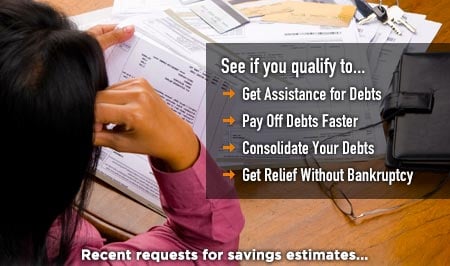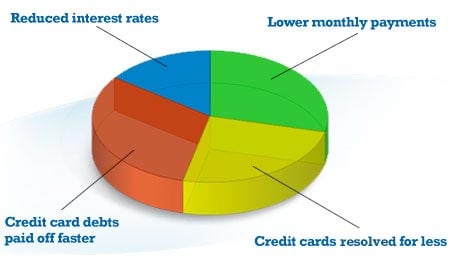
Credit Counseling
Chances are you're reading this because you've got some serious credit card and debt issues that are out of control and you need credit counseling. Whether the concern you have is for you or someone in your family - wife, husband, child or loved one, it's important to do something to get debts under control, whether you take action on your own to become more disciplined and pay down debts, or decide to go with a debt relief company to assist you.
While there are consumers who take on the goal of debt-reduction themselves, achieving the desired result using good-old fashioned financial discipline and smarts; the truth of the matter is that going solo for most of us is not easy or successful. The ones who accomplish it themselves usually start by paying off the high-interest cards first and kicking up payment amounts on all cards. And many will succeed if disciplined. Many others with mounting debt, however, may need some level of outside help, planning and process. Even if you use the services of debt relief specialists, it is still important to remember that no one can make debts magically go away.
See how debt relief can help you. Answer a few, simple questions to get a free debt relief estimate and savings analysis - at no cost to you.
These debt relief firms essentially exist to coordinate debt relief programs or negotiate on your behalf with credit card companies and other debtors. Regardless of the role these companies play and what they are able to mediate on your behalf, it is still up to YOU to live up to the terms each month of your debt relief program, in order to achieve a successful outcome.
Credit counseling is quite popular these days and this comes as no surprise. With all the people looking for assistance with debts, searching for good information online, even talking to friends and relatives, credit card counseling inquiries are greater than ever. Consumer credit counseling and advice is all around-us. And frankly with all the choices, with all the ads, with all the information, it gets confusing. Which way to go - counseling, debt management, debt settlement, debt reduction, non-profit credit counseling or local law firm. What's best? What's right? What's wrong? All great questions that need answers -- and any answer or any one debt solutions will not be appropriate for everyone. So let's break it down - one area at a time - so by the end of this article you'll have a much better idea of what's really going on in the often all-too-confusing credit card and debt relief landscape.
Credit Counseling Agencies
Consumer Credit Counseling comes in many shapes and sizes. From mainstream secular services used by the vast majority, to Christian credit counseling - companies who promote Biblical principles to achieve desired results for their clients; whichever way you lean, the vast numbers of credit counseling services run the gamut and provide to consumers vast differences in philosophy, tone and temperament. Even with the differences, the outcome - if you use a good and reliable company, and pay down your debt diligently - can be the same: You can succeed but you must have the discipline to stay on track -- and this is where many people fail in a debt consolidation or credit counseling program.
The delineation of agency types doesn't begin or end at secular. Credit counseling agencies also include for-profit and those who call themselves non-profit. Whether you choose a "for profit" or a "non profit" credit counseling agency, the end-result may be very similar: Consumer debt being reduced and brought under control in a way that's affordable. Those consumers choosing to pay their entire debt seek services provided by a credit counseling agency because their top priority is securing BETTER TERMS via lower interest rates...while getting on a proven plan. If followed carefully, this strategy of debt management can lead to a predictable debt-free day and the satisfaction that debts have been paid back in an honorable way -- as credit card companies offer the benefits of lower interest rates and give you the opportunity to regain control of your finances.
Ultimately this form of debt relief could help you accelerate your debt reduction and, as your debt-to-credit-limit-ratio improves, this could have a positive impact on your credit rating. On the subject of credit and credit counseling, it is important to note that, while credit counseling does not necessarily have a negative impact on your credit score -- the fact that you are "enrolled" in a credit counseling program may be "noted" on your credit report. Features and benefits of a credit counseling program of debt management can include changing several payment terms.
Changing payment terms can include:
- Lower Interest Rates
- Late Fees Waived
- Penalties Waived
- Lower, More Affordable Monthly Payments
- Consolidate All Unsecured Debts
- Create One Manageable Payment
Credit counseling agencies' aim is to have creditors review the debtor's financial circumstances and accept the above terms. If the debtor chooses a reliable and effective credit counseling agency, the goal is to have all outstanding unsecured debts become part of a structured Debt Management Plan (DMP). This can provide relief- pending the approval of credit card companies and un-secured debt holders -- including not just credit card debt, but doctors' offices, hospitals, clinics, utilities, club memberships, and cellular phone bills, among others. It's possible as some debt-troubled folks can attest, that debt will be eventually retired - if the plan is adhered to - in three to five years. Acting on the debtor's behalf, the agency distributes payments, often lower than what would normally be paid, to the various creditors until balances are zeroed out. People who stay disciplined and remain true to their debt management or debt consolidation program can and do step-off the debt treadmill on an accelerated timetable, typically in as little as 3-5 years.
Explore your debt relief options. Request a free debt relief estimate and savings analysis, at no obligation to you.
While credit counseling does offer significant benefits and the opportunity to work towards a debt free day, many people who enter these debt relief programs are in such dire straits that even setting aside the monthly funds needed to make a reduced consolidated payment becomes a problem. As a result, many people who enter credit counseling programs do not succeed. However, that is not saying that everyone who desires to do their best to retire debt doesn't deserve this opportunity. If individuals stick to the program organized by a reputable company, they can and do have the opportunity to achieve significant savings and benefits.
If you're in debt and looking for a way out, there is some good news: There are a variety of proven debt relief programs that, if followed faithfully, can help you reduce debt and get on a proven path to financial freedom, and credit counseling is one of the most popular forms of debt relief because it allows the consumers the opportunity to regain control of their finances, while paying down debts.
Debt Settlement Companies
Putting a debt settlement company in your corner to reduce debt is clearly a more aggressive form of debt relief. This is not to say it's more effective than credit counseling agencies mentioned above, it's just a different kind of battle, a more aggressive one - whereby consumers hope to, not pay off debt at an accelerated rate, but settle debt for less than the full amount owed. Enlisting a debt settlement company to work on your behalf may result in several outcomes:
- Substantially reduce the amount of debt owed via an agreed-upon lump-sum settlement
- Provide a bankruptcy alternative for the consumers who are in financial distress
- Reduce debt substantially, typically with negative impact on credit, but not as severe as bankruptcy
- While settlement set-aside is being accumulated, creditors may still take legal action against debtors
Why would credit card agree to accept less than the full amount owed from consumers? Because settlement may allow them to collect at least a reasonable portion of what is owed - a portion they might never receive if the consumer goes the route of bankruptcy. It also lessens the likelihood that the credit card company will decide to "sell off" or "charge off" the "bad debt" to a third party. In these situations, the third-party typically buys the bad-debt for far less, paying substantially less than what the credit card company might receive in a negotiated settlement - a fair and reasonable offer - from the consumer. If settlement is a debt relief solution you are considering, you may be wondering how much you can reasonably expect to save.
The truth of the matter is that it varies and is unique on a case-by-case basis, depending largely on your financial situation, how much credit card debt you have and the settlement policies of the companies involved. The bottom line in settlement programs is that YOU are responsible for setting aside monies that can be used to "settle" with credit card companies. While this may be, in sum, much less than the amount you are currently paying each month on your cards, it still is an amount you have to accumulate in order to make a reasonable settlement offer. A recent positive development for consumers is that debt settlement companies no longer are allowed to charge up-front-settlement fees. Service fees are collected only AFTER debts have been settled. There is an exception: If settlement is performed by "attorney-based" companies who meet face-to-face with individuals, up-front fees still may be charged.
Request a free debt relief analysis and savings estimate in minutes. Start by answering a few, simple questions here.
Debt Consolidation Loans
In addition, another option to get relief is a "debt consolidation loan". In a nutshell, this loan allows debtors to combine all high interest rate debts into one lower interest rate loan. The net effect is two-fold: It reduces the monthly payment and overall debt-serving costs to the consumer while potentially shortening, in some cases, the length of time it takes to satisfy the debt. The one caveat and red-flag that should be raised when it comes to any debt-consolidation loan, is that it's not be for everybody. While the concept of doing a debt-consolidation loan is a viable one, some consumers will - despite their best intentions - end up running up high credit card debts all over again. They're then faced with a debt-consolidation loan AND credit card bills - a kind of double whammy that puts the debtor behind the financial eight-ball, more precarious than ever. On top of that, these loans are often secured by an asset with real value or equity, i.e. a home. If the consumer defaults on the loan, the consumer has effectively put the house at risk - trading off secured debt and assets to insure unsecured debts, i.e. a credit card.
Understanding Debt Relief
Regardless of which debt relief option you choose, if any, it is important to take control of your personal debt. Out of control debt can be damaging to individuals and families. Debt relief begins with doing all you can to live within your means and not spend money on impulse purchases unless you truly have the ability to pay for the purchase in the short term. If you do get into trouble with high-interest, unsecured debt, be encouraged that there are a variety of debt relief options for you to consider. Do your homework, ask good questions like how much are you truly likely to save, how long will it take you to realize these benefits, and also inquire as to the legal and tax implications of any debt relief program. Your debt is your responsibility but if you choose a strong debt relief solution and a reputable company, there is a way out that can not only reduce stress, but save a substantial amount of money as well.
Through this site, you may request a free debt relief estimate and savings analysis - at no cost to you. See how debt relief can help you.























